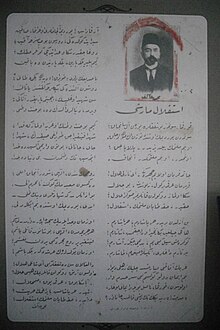İstiklâl Marşı
| İstiklâl Marşı | |
|---|---|
| Title in German | Independence march |
| country |
|
| Usage period | 1921– |
| text | Mehmet Akif Ersoy |
| melody | Osman Zeki Üngör Edgar Manas |
| Sheet of music | JPG |
| Audio files | |

The İstiklâl Marşı ( Ottoman استقلال مارشی , Freedom ' is or, Independence March') since 12. March 1921 , the national anthem of the Republic of Turkey and the international law unrecognized Turkish Republic of Northern Cyprus . Before unification with the Turkish Republic in 1939, the march was also the national anthem of Hatay State , now Turkey's Hatay Province . The text comes from the poet Mehmet Akif Ersoy , the music from Osman Zeki Üngör . Text and music by İstiklâl Marşı were selected in a competition. The Armenian origin Turk Edgar Manas arranged the orchestral version of the anthem.
history
The independence march was designated as the national anthem on March 12, 1921. Previously, a competition had been held to find the best solution for the National March. The poet Mehmet Akif Ersoy wrote the text. 24 composers took part in another competition to select the music, in which the melody of Ali Rıfat Çağatay won. Eight years later they chose a different melody and have since sung the hymn to a composition by the director of the president's symphony orchestra, Zeki Üngör.
Only the first two stanzas are sung as a hymn.
text
Original text in Turkish
İstiklâl Marşı
|
Korkma, sönmez bu şafaklarda yüzen al sancak; |
Bastığın yerleri “toprak” diyerek geçme, tanı! |
||
translation
Translation by Eduard Zuckmayer :
Confident, the morning star broke,
In the new light our flag blows ''.
Yes, you should blow,
As long as one last home still stands,
A stove smokes in our fatherland.
You our star, you eternally shining shine,
you are ours, yours we are whole
Do not turn your face from us,
O crescent moon,
accustomed to victory for ever, seem
friendly to us
And give us peace and happiness,
the heroic people who consecrated their blood to you.
Preserve our freedom, for whom we glow, the
highest good for the people who will one day set themselves free.
See also
literature
- Johann Strauss: Turkish national anthems and an anthem of Württemberg provenance. In: Yavuz Köse (Ed.): Şehrâyîn. The world of the Ottomans, the Ottomans in the world - perceptions, encounters and boundaries. Festschrift for Hans Georg Majer , with the collaboration of Tobias Völker. Harrassowitz Verlag, Wiesbaden 2012, ISBN 978-3-447-06739-3 , pp. 475-494.
Web links
Documents
- Text of the hymn (PDF; 71 kB; Turkish)
- Detailed explanation of the text (PDF; 168 kB; Turkish)
- Notes of the March (PDF)
Audio files
- The hymn (Orchestra of the Turkish Armed Forces; Choir of the Ministry of Culture) can be downloaded as a .zip file
- The hymn (symphony orchestra of the presidential office) can be downloaded as a .zip file
- The hymn (instrumental) can be downloaded as a .zip file
Individual evidence
- ↑ Osman Zeki Üngör'ün Hayatı ( Memento from March 27, 2010 in the Internet Archive )
- ↑ Şahin Ali Söylemezoğlu: The other side of the coin . Paperback. Önel Verlag, 2005, p. 23
- ↑ Quoted from: National anthems. Texts and melodies . 2nd, improved and expanded edition, Stuttgart 1982, p. 179. Translator of the national anthem at Reclam (taken from Die Nationalhymnen der Erde with German translations and piano setting . Ed. By the Institute for Foreign Relations in Stuttgart, Munich 1958) is Eduard Zuckmayer ( Ankara) . He was the brother of Carl Zuckmayer and the leading music teacher in Turkey, as can be read in the link.


